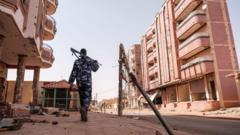**With the fall of the Assad regime, advocacy for legal prosecution intensifies, yet the possibility of acquiring justice remains uncertain as the former president remains protected in Russia.**
**Pursuing Justice: Activists Renew Efforts Against Assad’s Regime**

**Pursuing Justice: Activists Renew Efforts Against Assad’s Regime**
**Human rights groups gain momentum as they seek accountability for Syria's brutal past.**
In a significant shift amid the upheaval in Syria, human rights activists are revitalizing their mission to hold accountable those responsible for the heinous crimes committed by the Assad regime during its decades-long rule. The recent political changes have provided new opportunities for activists, allowing them to investigate prison sites, conduct interviews with witnesses, and construct legal cases for future prosecutions.
Despite these opportunities, there is a shared sense of frustration within the activist community as questions mount regarding the prosecution of former President Bashar al-Assad. Currently residing in Russia, it appears unlikely that he will face trial anytime soon. Nevertheless, longstanding advocates for human rights remain resolute in their pursuit of justice. Fadel Abdul Ghany, director of the Syrian Network for Human Rights, emphasized the need to target the entrenched systems of oppression rather than focus solely on Assad himself. “The Assad regime is not just the man himself. We need to target the security forces and the army and the tools Assad used to commit those crimes,” said Abdul Ghany.
The Syrian civil war has been a significant period for human rights advocacy, largely due to the extensive nature of the abuses reported. According to activists, over 200,000 civilians have been killed in the conflict, with at least 15,000 of those deaths attributed to torture or killings within the regime’s prison systems. Furthermore, approximately 130,000 individuals are still reported missing.
Organizations such as the Commission for International Justice and Accountability and the Syrian Observatory for Human Rights have tirelessly documented these violations and have laid the groundwork for future legal action, striving to ensure that justice, no matter how elusive, is ultimately served. As the climate begins to shift, the work of these groups may finally lead to accountability for the crimes that have haunted Syria for over fifty years.
Despite these opportunities, there is a shared sense of frustration within the activist community as questions mount regarding the prosecution of former President Bashar al-Assad. Currently residing in Russia, it appears unlikely that he will face trial anytime soon. Nevertheless, longstanding advocates for human rights remain resolute in their pursuit of justice. Fadel Abdul Ghany, director of the Syrian Network for Human Rights, emphasized the need to target the entrenched systems of oppression rather than focus solely on Assad himself. “The Assad regime is not just the man himself. We need to target the security forces and the army and the tools Assad used to commit those crimes,” said Abdul Ghany.
The Syrian civil war has been a significant period for human rights advocacy, largely due to the extensive nature of the abuses reported. According to activists, over 200,000 civilians have been killed in the conflict, with at least 15,000 of those deaths attributed to torture or killings within the regime’s prison systems. Furthermore, approximately 130,000 individuals are still reported missing.
Organizations such as the Commission for International Justice and Accountability and the Syrian Observatory for Human Rights have tirelessly documented these violations and have laid the groundwork for future legal action, striving to ensure that justice, no matter how elusive, is ultimately served. As the climate begins to shift, the work of these groups may finally lead to accountability for the crimes that have haunted Syria for over fifty years.




















